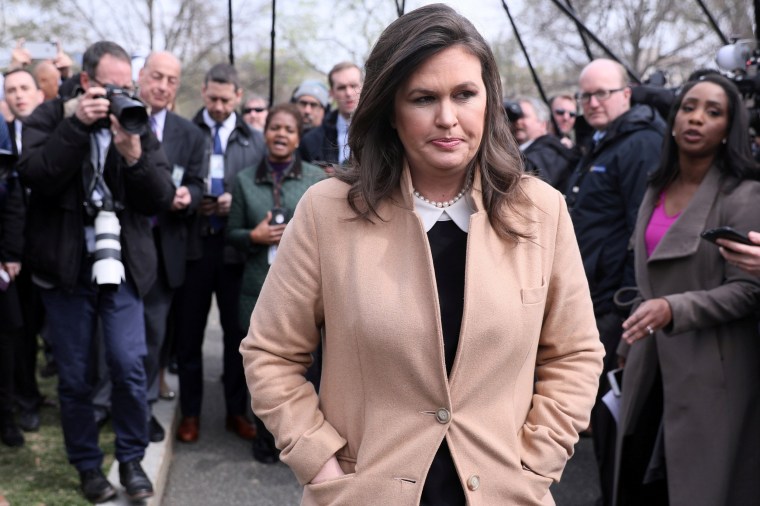Late last week, The Atlantic's Jeffrey Goldberg published a staggering report on Donald Trump, his denigration of those who serve in the military, and his condemnation of fallen American heroes as "suckers" and "losers." As we've discussed, the president has pushed back aggressively, relying on tactics that are far from credible, and some of his partisan allies have tried to rally to his defense.
Take former White House Press Secretary Sarah Huckabee Sanders, for example, who released a video over the holiday weekend, in which she speaks directly to the camera -- from prepared remarks -- to vouch for Trump's respect for those in the armed forces. Sanders included a first-hand account:
"I've also sat in the room when the president had to make the most difficult calls of his presidency: when he had to let a parent know that their son had been killed in the line of duty. That's a call no president wants to make. In those moments, I saw the president's heart. And I also saw his commitment to the men and women of our great military."
She used nearly identical language in an ABC News interview, insisting that her version of events was "the honest account."
On the surface, there's a disconnect between the claim and the allegation: Trump's capacity for extending condolences over the phone doesn't necessarily mean he honors those who serve. Indeed, the Republican has spent many years suggesting he does not respect military heroes and their sacrifices.
But there's a more fundamental problem with Sanders' claim: she couldn't have seen the president "let a parent know that their son had been killed in the line of duty" because that's not a call any president ever makes. In the United States, family notifications like these don't come from the Oval Office.
As the New York Times reported, "Each branch of the military has its own protocols for notifying next of kin, but all require a field grade officer of equal or higher grade than the member whose death they are notifying to do so in person. A chaplain or medical personnel is also expected to attend, in person, if possible, but notification is expected to be completed within eight hours of learning about the casualty."
Sanders, who appears to be gearing up for a Republican gubernatorial campaign in Arkansas, later conceded that she misspoke, explaining that she'd seen Trump make condolences calls, not notification calls as she'd claimed.
A Washington Post analysis added, "The problem with what Sanders said is not so much how she got it wrong -- though that's still bad -- but in how she held it up as evidence of Trump's support of the military. If the president is such a big backer of troops and sympathetic to the war dead -- which was called into question by the Atlantic's report last week and by subsequent confirmations of Trump's alleged comments -- why the need to exaggerate on this particular point? And that goes double for an interview in which Sanders was pitching herself as the 'honest' arbiter of what transpired behind closed doors in the White House."
It doesn't help that Trump's condolences calls have themselves become controversial, including a feud with a grieving pregnant widow in 2017.
Stepping back, I think there are a couple of overarching problems to consider going forward. The first, of course, is Sarah Huckabee Sanders' tarnished credibility. In May 2017, for example, the Republican spokesperson told reporters that "countless" FBI agents had told the White House that they had lost confidence in James Comey before the president fired him. When she was later asked about those comments by Special Counsel Robert Mueller's team, Sanders conceded that she'd made up the claim.
It was a jarring incident, to be sure, but it was hardly the only time Sanders was caught making claims that later proved to be false.
This week, she's insisting that she has "the honest account," which included an element Sanders now concedes was wrong. None of this will help her restore her reputation ahead of a likely bid for statewide office.
But the second problem relates to the president: if some of his closest allies can't defend his record on respecting the military with honest accounts, what does that say about Trump?

